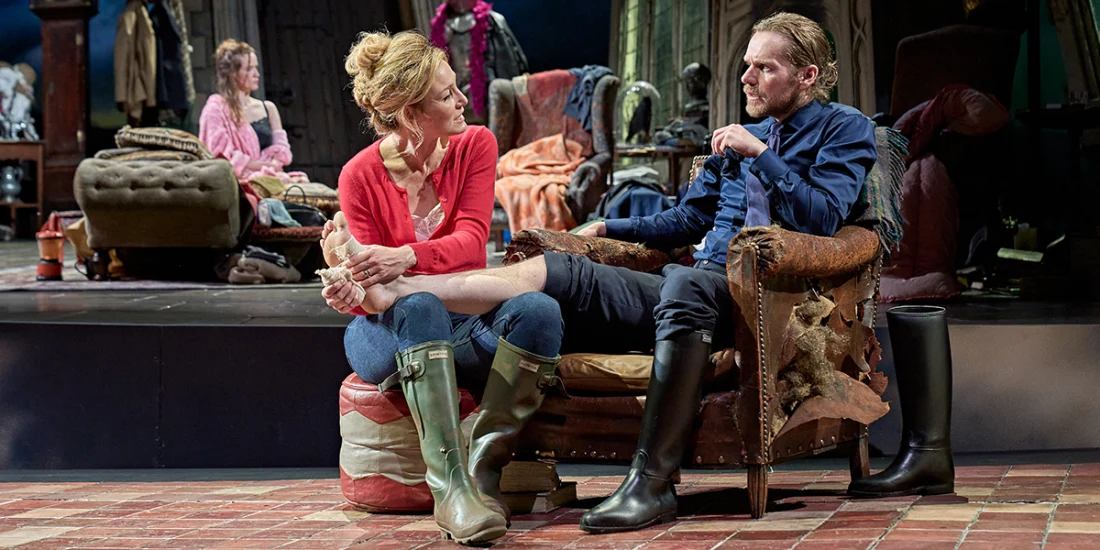'Manor' review — Moira Buffini's dark comedy wrestles with topical issues a little too bluntly
Moira Buffini's state-of-the-nation play is pegged to that irresistible trope: the dark and stormy night, with a group of strangers forced to seek shelter in a spooky manor house. Naturally it's a powder keg of personalities, and, with Chekhov's gun well established, a storm of violence is inevitable.
However, Manor is a curious beast. It certainly nods to the eerie thriller: with the power out, the only light is flickering candles, and there's a ghostly presence upstairs - a possible remnant of the Civil War. But that quickly gives way to a mix of macabre humour, furious satire, and overt political commentary, with the characterisation similarly zipping between coolly naturalistic and preposterously heightened.
We begin with an hysterical confrontation between the unhappily married Lady Diana, inheritor of her family's now crumbling manor house, and former musician, now fulltime drunk and drug addict Pete. During a nasty tussle, Pete - who is high on magic mushrooms - tumbles down the stairs. Diana quickly reframes this to daughter Isis as an accident; not the last time in the play that someone will bend the truth to suit their own narrative.
Into this fraught situation come various refugees from the pounding storm and dangerous floods, which have now cut off the roads as the river bursts its banks. They include local vicar Dominic, holidaying mother and daughter Ripley and Dora (the latter, sopping wet, cut off from wi-fi and apoplectic: "We could have stayed in Balham!"), caravan dweller Perry, and a mysterious trio: Ted, his blind fiancée Ruth, and Anton.
We gradually come to learn that the charismatic Ted is in fact the leader of a far-right group called Albion. Historian Ruth, who defends colonialisation, genocide, and slavery as part of the natural order, as well as old-fashioned gender roles that see men acting as knights and women giving up work, fuels his warped ideology. The vulnerable Anton is one of their disciples.
Ruth expounds her fascist theories with chilling assurance while black A&E nurse Ripley, teeth gritted, tends her wounds - and figures out that Ted was the one who injured Ruth. Meanwhile, Ted is busy seducing Diana with promises of restoring her Restoration-era home, just as he wants to restore England. We are both, he purrs, "exceptional", likening his superiority complex to her aristocratic lineage. That does chime with Diana: "It's what I was taught from an early age."
Buffini's play, directed by her sister Fiona, works best as a pitch-dark comedy. Nancy Carroll is superb as the haughty Diana, who, in a cloud of shock, euphoria, and bone-deep weariness, simply cannot be bothered with social niceties any longer. Michele Austin and Shaniqua Okwok, as Ripley and Dora respectively, are very funny as the bewildered Londoners thrust into this insanity, and Edward Judge, as Perry, keeps up an amusing running commentary - although he is also the butt of some tiresome sizeist jokes.
But, other than David Hargreaves's kindly vicar, it's impossible to buy most of these characters. The deluded, egotistical Pete is so extraordinarily infuriating that I'm afraid I longed for his demise, while Diana is a familiar toff type, Ruth more a mouthpiece than an individual, and Anton is a walking radicalisation case study. Shaun Evans's Jordan Peterson riff, though compelling, never really convinces, while Isis is handed a clunky speech about climate change and generational betrayal.
Lez Brotherston's surreal set almost feels more complex and alive. It's the manor house with walls and ceiling blasted off, so we get a crooked staircase to nowhere, shards of stained glass, a mighty but stranded door, and furious clouds rolling straight in (courtesy of Nina Dunn's video projections). This striking visual carries much of Buffini's argument on its own: the dangerous invasions, war with nature, and our wrestling with history, privilege, identity, and ownership. It's a shame that the text is much blunter, giving us starkly oppositional viewpoints instead of trusting us to discover those ideas through the actual people.
Manor is at the National Theatre to 1 January.
Photo credit: Manor (Photo by Manuel Harlan)
Originally published on
